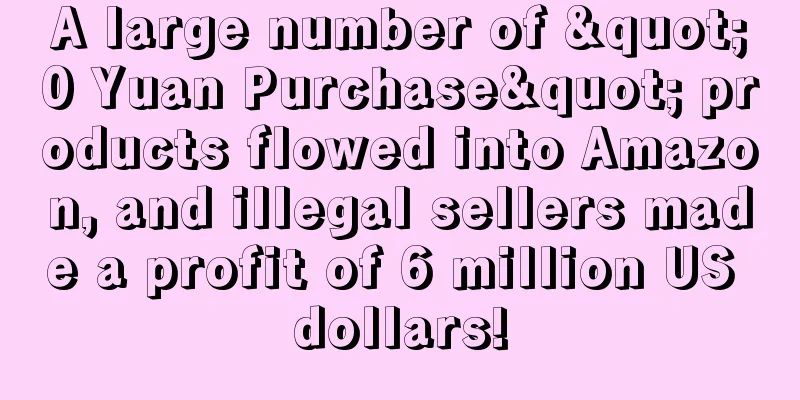A large number of "0 Yuan Purchase" products flowed into Amazon, and illegal sellers made a profit of 6 million US dollars!

|
In the past year, several major robberies occurred at Louis Vuitton stores in Union Square in San Francisco and the nearby Nordstrom , involving more than 80 robbers .
These robbers sold the stolen goods on e-commerce websites at lower prices, causing serious losses to offline retail stores and seriously disrupting the market order of e-commerce platforms.
The continued economic downturn and the impact of inflation have made "zero-dollar purchases" more and more frequent in Europe and the United States. These products are sold at ultra-low prices on major e-commerce platforms. The continuous "zero-dollar purchases" have had a serious impact on sellers who normally sell goods. Many sellers complained that the traffic of their stores has declined and sales have dropped .
An Altamonte man sold more than $ 6 million in stolen goods at Amazon, Walmart and Sears this month , and in the largest retail crime bust in California history , law enforcement seized $ 8 million in stolen goods.
Selling stolen goods is easy on Facebook Marketplace . Although it violates platform policies , Meta generally does not need to provide proof of identity or provide the basic name and verifiable email or phone number required to open a Facebook account .
An Ohio man said he was making $2,500 a day by selling stolen electric bikes on Facebook Marketplace for half the price and then trading them with customers in parking lots.
Online retailers have long differentiated themselves from traditional offline retail stores by claiming that they are not responsible for the quality and safety of products sold by third-party sellers , thereby facilitating robbery crimes on another level.
In order to eliminate such criminal cases, in December last year , 20 major retailers including Home Depot , Best Buy , Walgreens and Kroger wrote to Congress , asking online platforms to conduct stricter verification of sellers.
The House of Representatives passed a bill called the INFORM Consumers Act that would require some sellers on sites like Amazon, eBay and Facebook Marketplace to provide verifiable bank accounts, tax IDs , work emails and phone numbers.
Amazon, eBay and Facebook said they already have various protections in place to keep stolen goods from reaching their sites.
eBay relies primarily on a program called PROACT , which alerts retailers if a major theft occurs and then verifies whether the stolen merchandise is being sold on its site. eBay has spent millions of dollars on staff and back-end technology to run the program .
Amazon said in a statement: "Amazon does not allow third-party sellers to sell stolen goods on the site , and we work closely with law enforcement, retailers, and brands to stop bad actors and hold them accountable when such behavior occurs, including by withholding funds, terminating accounts , and making law enforcement referrals . "
The judicial department’s crackdown on robbery crimes is far from enough. Major e-commerce platforms should conduct stricter supervision on third-party sellers, strengthen identity verification and review of sellers , and maintain market order. 0 yuan purchase Amazon Platform |
Recommend
What is lightpack? lightpack Review, Features
Lightpack was originally an open source product th...
With a market share of only 1/7 of Amazon, Walmart still has a long way to go in e-commerce
According to data released by the analysis compan...
Shipping costs have stopped falling and rebounded. Will US ports be congested again?
Since the beginning of the year, shipping costs h...
Nearly 26,000 Shopify sellers are suspected of fraud, and more than 70% of them adopt the dropshipping model
I believe that sellers must be aware of the "...
eBay report: Christmas shopping in Germany in 2024 will start at the end of August, and many popular categories will usher in peak season sales in advance
eBay Germany recently released the "2024 Chr...
A new round of "stockpiling": What else do Americans want to stockpile besides toilet paper?
Inmar Intelligence said in a recent research repo...
The number of paying buyers on Alibaba International Station increased by 30% year-on-year in the first half of the year: emerging industries such as machinery are booming
Currently, global trade is entering a new round o...
2022 US Sports Industry Outlook: Apparel, Footwear and Equipment Will Continue to Grow
Matt Powell said that the US sports retail busine...
What is Shopaimi? Shopaimi Review, Features
Shopaimi is a high-tech enterprise focusing on th...
Global mobile retail sales grew 30% in the first half of the year
Although physical stores began to reopen in the f...
Cainiao joins hands with South Korea's CJ Logistics to accelerate the realization of "three-day delivery" between China and South Korea and optimize AliExpress logistics services
Recently, Cainiao and South Korea's CJ Logist...
What is a Canonical URL? Canonical URL Review, Features
The authoritative link (i.e. canonical URL) is ge...
What is newhope-afr? newhope-afr Review, Features
Newhope-afr mainly supplies agricultural machinery...
One company, two accounts? A cross-border e-commerce company ran into trouble and was fined millions!
The fact that Wei Ya was fined 1.341 billion yuan...
The number of infections in Vietnam has surged, and many OEM shoe factories have extended their shutdowns!
According to the Vietnamese Ministry of Health: V...









